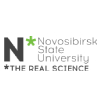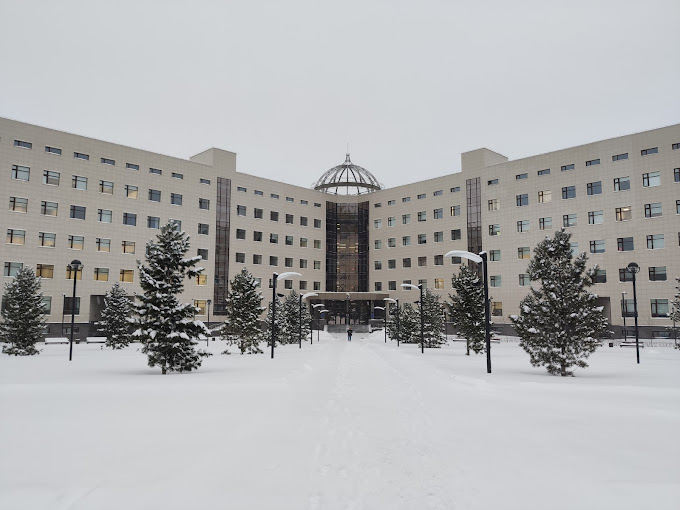1, Pirogova str., Novosibirsk 630090, Russia
Career Counselling

Novosibirsk State University is the highest ranked institution of higher education in the Asian portion of Russia. Located in the city of Novosibirsk in Siberia, it was established in 1958, and has quickly grown in size and prominence. It is home to nearly 9,000 students, of which 1,400 are from outside Russia.
Academic and research activities at NSU are divided into 3 Institutes (Humanities, Medicine and Psychology, and Philosophy and Law) and 6 Departments (Physics, Natural Sciences, Economics, Mathematics and Mechanics, Information Technologi...
| Establishment year | 1958 |
| Total Students | 8,600 |
| International Students | 1,400 |
| QS World University Rankings 2024 | =421 |
| Campus Size | N/A |
| Total Number of Campuses | 1 |
| University Website | https://english.nsu.ru/ |
| No. of Schools and Divisions | 3 Institutes and 6 Departments |
| Nobel Prize Winner Alumni | 0 |
| No. of Education Programs | 51 (undergraduate), 118 (Master’s), 62 (PhD) |
| Student to Faculty ratio | 3.5:1 |
NSU offers undergraduate and postgraduate courses through 3 Institutes and 6 Departments, which are further subdivided into Sections.
International applicants (both undergraduate and postgraduate) to NSU must satisfy the following requirements:
The following steps are involved in the application procedure for all international students at Novosibirsk State University:
Tuition fees for international students at Novosibirsk State University are as follows:
Value Added Tax may be added to these amounts; exact values for the latest academic year can be found by contacting the International Relations Office. All applicants should check the tuition fee amount for their courses of interest on the University website.
Accommodation costs for international students can vary widely according to whether the student chooses a room in a dormitory on campus or in an external flat. Dormitory fees come up to about 1,200 rubles per month, or about 200 USD per year. Apartment costs outside the University can range from 10,000 to 20,000 rubles per month, for a total cost of up to 200,000 rubles per academic year. The University maintains an accurate database to help estimate other living costs, including food, shopping for groceries, personal items, and travel. International students must purchase health insurance for the duration of their course at NSU. The cost of this is approximately 3,500 rubles (~USD 42) per year.

The Novosibirsk State University campus is well equipped with facilities for students, including a Wellness Center with invigorating baths and massages, free fitness rooms in every dormitory, a University Recreation Camp on the banks of the Ob River, and a Sports Center, which is one of the largest in the city of Novosibirsk.
The NSU Sports Center has several areas where different popular sports can be played, including two swimming pools for both adults and children, a tennis court, two stadiums for outdoor sports like football, a mini-football field, three saunas for rest and recuperation, and seven specialized halls for indoor fitness activities: aerobics, gymnastics, games, wrestling, boxing, and a gymnasium. 40 sports can be played in the Sports Center by both novices and experienced athletes, including Basketball, Fencing, Karate, Mountain Hiking, Taekwondo, Tai Chi, Sport Shooting, Volleyball, Skiing, and Table Tennis.

There are several cultural clubs on campus, catering to the interests of students who want to develop their musical, dance, and theater skills. From the Academic Choir to the Contemporary Dance Studio to the Ballroom Dance School to Cheerleading and Theater troupes, every student can pursue their passion for cultural and artistic activities; many of these clubs organize annual events and performances.
Annual festivals and competitions are awaited by all members of the NSU Community; for example, the Mayovka rock concert, the Interweek International Youth Festival, Career Week, the Open Space Picnic, the Comedy Show, and the Miss NSU Competition.
Foreign students at NSU (both undergraduate and postgraduate) can apply for the Russian Government Scholarship at the time of admission to the University. This entails a full tuition fee waiver and a monthly stipend, even though students still have to pay for accommodation and living costs. There are limited scholarships based on the course of interest and the country of origin of the applicant. The application process starts in January and ends between March and June, depending on the country of the applicant. This happens before the normal admission procedure so that unsuccessful candidates can apply for normal fee paying places at NSU.
Applicants to this Scholarship must register on the Education in Russia website and fill out the application, taking care to choose Novosibirsk State University as their first choice. In addition to detailed academic records and transcripts that must be translated into Russian and uploaded, candidates may also have to write essays and a personal statement to present their case for being chosen for this prestigious scholarship. A recent (taken within the previous three months) medical certificate and negative HIV test reports must also be submitted to the local Embassy and uploaded on the website.
Students of certain partner universities of NSU can join the University and study there without having to pay tuition fees.
Through the Erasmus+ Scheme, students at NSU can avail of a scholarship to spend part of their degree studying at one of six partner universities, located in France, the United Kingdom, Germany, and Ireland.
International students can avail themselves of scholarship schemes in their countries to study at NSU without having to pay tuition fees. For example, the DAAD in Germany and the Fulbright Scholarship in the USA place several students at Novosibirsk State University every year.
The Open Doors Russian Scholarship Project allows Master's and PhD applicants to win a full scholarship. This is organized by the Association of Global Universities, and candidates must apply on the website half a year before they apply to NSU. After uploading a detailed personal and research profile, they must solve a set of contest tasks in the form of problems related to their field of interest. Results are declared in February and March every year.
